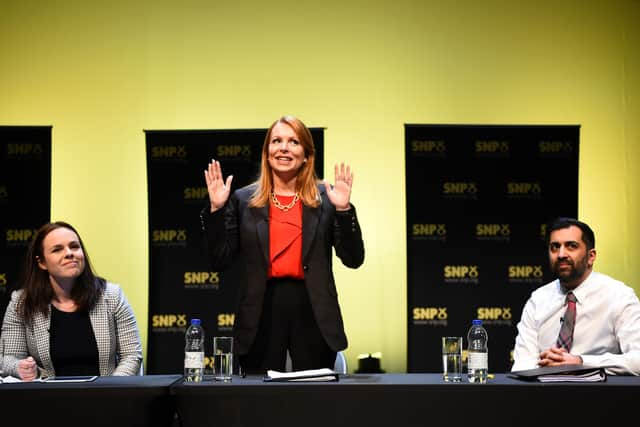SNP leadership contest: Row over voting process adds fuel to the fire of delusional conspiracy theorists and distracts from serious politics – Joyce McMillan
Our hero sees his beloved childhood home, and is visited by his long-dead wife; but the scientist next door – well, his mind produces strange little gibbering monsters who squeal and growl horribly along the corridors, when they escape from his lab.
And as an observer of the current SNP leadership election, it’s hard not to feel like Tarkovsky’s hero, suddenly confronted by the twitching inner demons of Scottish politics, as sensible lab boss Nicola Sturgeon heads for the exit. First out of confinement were the wailing ghosts of old-time religion, as Kate Forbes – the brightest of the three candidates, but one who chose the ultra-conservative Free Church of Scotland over the much more liberal Church of Scotland into which she was born – roundly declared her opposition to equal marriage for gay couples, and told a nation where half of all babies are born to unmarried couples that, in her view, having children out of wedlock is wrong.
Advertisement
Hide AdAdvertisement
Hide AdThe ensuing debate over Forbes and faith now seems relatively innocuous, though, compared with the firestorm of disinformation, exaggeration, polarisation and conspiracy theories that has now broken out both within and beyond SNP ranks. Some of this hysteria undoubtedly comes from the unionist side of the debate; indeed there are many opponents of independence who now firmly believe that eight years of Sturgeon government has “destroyed” Scotland and its public services, and that this woman who led the nation through the pandemic with such sober attention to detail is a demon of division, who has never in her life given a thought to anything but independence.
And if it is difficult to see any connection to reality in that view of Scotland’s current state, then it is all but impossible to fathom a situation in which two of the three SNP leadership candidates are now adding fuel to the fire of the conspiracy theories which form the third set of monsters unleashed by the leadership contest, most often found among present and former SNP supporters for whom virulent hatred of Sturgeon and her allies has become a governing obsession.
There is no excuse, of course, for the immediate and long-term behaviours of the SNP organisation – secretiveness, controlling behaviour, Peter Murrell’s continued presence as chief executive – which have themselves stoked this fire. It is some leap, though, to move from these justified criticisms to the florid accusations of criminality, corruption and entrenched evil that now flourish in some ex-SNP quarters. The current main accusation from this group is that the SNP cannot be trusted to run a fair leadership election. Yet instead of trying to dial down this rampant culture of accusation, now being directed by some even against the highly respected online voting company to whom the election has been outsourced, both Kate Forbes and Ash Regan have now signed a letter which casts further doubt on the election process.
And the tragedy of all this, of course, is that this entire Trumpian landscape of howling spectres and gibbering demons essentially acts as a profound distraction from, and a substitute for, the vital political debates on which Scotland and every nation now need to focus, if we are to have any viable future at all. This week at Westminster, the Chancellor announced a budget which entails – according to the Office for Budget Responsibility – a shocking 5.6 per cent fall in UK household incomes over two years, the largest such decline on record; while elsewhere, the Conservative government seeks to distract from its appalling record in office by feeding the cruel fiction that the relatively modest number of people seeking asylum in the UK each year represents both an unmanageable crisis, and a threatened “invasion”.
For a while, I dared to hope that Scotland had succeeded in avoiding some of the worst features of this kind of government by myth and illusion. I thought, for example, that Scotland's resounding 2016 vote to remain in the European Union showed some resistance to opportunistic blather and deliberate disinformation; and indeed, according to last week’s Ipsos Mori poll, Scottish voters remain down to earth in their priorities. The NHS, the cost of living and economic policy are their top concerns, with culture wars issues such as immigration, and the bitter debate over gender recognition, rated as least important.


The truth is, though, that the very shape of the current leadership debate – with one candidate best known for her ministerial resignation over gender recognition, and another whose beliefs on social matters represent an incipient culture war in themselves – might have been designed to draw all these 21st-century demons of delusion and polarisation straight into mainstream of Scottish politics. Effective politics, after all, which can truly defend the people against huge vested interests, demands a certain level of trust between voters and politicians, including a basic agreement about the realities we face.
Now, though, the decline of trust within the SNP itself, exaggerated through the sharp polarisations of social media, and naturally exploited by the party’s opponents, has reduced our politics to exactly that level of baffled mutual incomprehension, and shrill and discredited impotence, that most perfectly serves the interests of those who already wield huge, unaccountable power and wealth.
And those of us who care about the prospects for a sustainable future in Scotland and the world, for social justice and for democracy itself, must now accept that any process of healing, after this spectacular meltdown, will be a long and difficult one – above all for the SNP, but also for Scotland itself, for its hard-won right to devolved government, and for all those involved in our public life, of all parties, and none.
Comments
Want to join the conversation? Please or to comment on this article.
